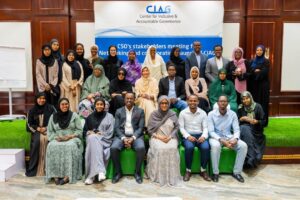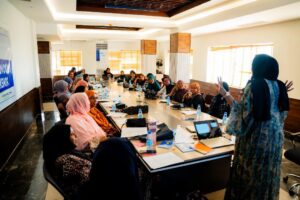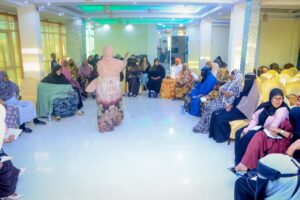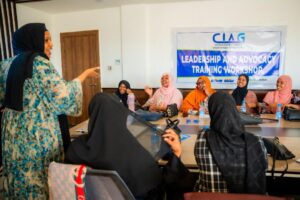On December 10th, 2024, as part of our Promoting Inclusive and Accountable Governance in Somaliland project, supported by Heinrich Boell Stiftung (HBS) International Programs, Horn of Africa BMZ, Regional Programme, CIAG hosted the first public forum on the role of women and the newly elected government of Somaliland. Over 110 participants, including politicians, CSO activists, members of political parties, and academics attended. The purpose of the forum was to amplify women’s voices and ensure their concerns are heard. It was also intended to advocate for women’s meaningful inclusion in the newly formed government, reinforcing their role in shaping a more equitable and inclusive leadership structure.
The event began with a 40-minute panel discussion featuring three speakers out of the four invited, as one did not show up due to a miscommunication of the date. Each panelist, Sacdia Muse, Dr. Nimco Mohmoud, and Member of Parliament Mukhtar Maydhane, addressed different issues in the discussions. This was followed by comments, feedback, and suggestions from the attendees.
Additionally, the event was broadcast live on two national TV stations, Astaan and Horn Cable. There was also live posting on various social media outlets such as Facebook and Instagram. Sound bites of key individuals promoting the event were recorded and posted live as well. Based on the media review, close to 40,000 people viewed the event online by the next morning. Feedback and comments were positive, and this event made it possible for CIAG to go online and connect with the general public.
Key issues that came out of the discussion included:
• Cultural and Societal Norms: Gender stereotypes and societal expectations that limit women’s roles in politics.
• Lack of Access to Power or Decision-Makers: Individuals with significant political influence are more likely to be appointed, implying that women don’t have the political clout to get there.
• Lack of Support Structures: Many women do not receive mentorship or the necessary support to navigate the complex political environment, particularly in political parties’ platforms.
The panelists also discussed at length the importance of gender-sensitive legislation and policies in both the government and political parties. The key aspects included:
• Women Quota: The introduction of gender quotas to ensure a minimum representation of women in government bodies, which has proven successful in several countries.
• Women Support Policies: Expanding policies that support women’s political participation in Somaliland to enhance women’s empowerment.
• Education and Training: Empowering young women through education and leadership training to prepare them for political participation.
Another issue that came out during the discussion was the need for innovative strategies to increase women’s visibility and participation in decision-making roles. The participants recommended the following:
• Empowering Young Women: Through education and leadership training to prepare them for political participation and public service roles.
• Inclusive Political Parties: Encouraging political parties to adopt inclusive candidate selection processes, ensuring women are given equal opportunities to run for office.
• Fundraising for Political Campaigns: Teaching women how to secure funding and build a strong financial foundation for political campaigns to overcome one of their main challenges.
• Social Media Campaigns: Leveraging digital platforms to raise awareness about women leaders and amplify their voices in public discourse.
• Mentorship Programs: Establishing mentorship networks to guide young women in navigating political careers and leadership roles.
• Building Alliances and Coalitions: How women can form strong political networks, collaborate with other political stakeholders such as traditional and religious leaders, and forge strategic partnerships with allies to further their agendas in governance and politics.
In conclusion, the forum made an appeal to the new government for better allocation in terms of women’s appointments and to ensure that women’s representation becomes a central goal in all aspects of the government, as stated in their political manifestos.





